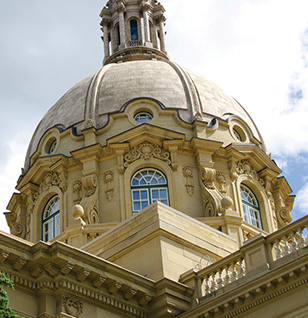Page Content
 Government and opposition debate education issues
Government and opposition debate education issues
The spring session of the 30th legislature began in February. Here is a summary of the education-related discussions that took place from April 25 to 28.
K–6 draft curriculum
April 25—Sarah Hoffman (NDP—Edmonton-Glenora) asked Education Minister Adriana LaGrange if she would delay implementation of the curriculum until a reasonable number of public, Catholic and francophone boards are willing to pilot it. LaGrange answered that she’s already hearing from school authorities starting the process of ensuring that they have professional development and the resources available for their teachers. LaGrange referenced Fort Vermilion’s piloting of the curriculum. Hoffman noted that the minister had to drive eight hours to find one school division willing to pilot her “dumpster fire of a curriculum.”
Tracy Allard (UCP— Grande Prairie) asked LaGrange to outline the implementation plan to support the new curriculum, and how it will be resourced appropriately when implemented across Alberta in the fall. LaGrange stated there will be a staged approach to implementing the new curriculum. Beginning in September 2022, English language arts and mathematics will be implemented for students in kindergarten to Grade 3 as well as physical education and wellness for K–6 students. Implementation of the new subjects by common grade groupings such as K–3 and 4–6 will ensure successful implementation, and $59 million in this upcoming year has been allocated to help prepare teachers, parents and students for the new curriculum.
Private school financial data reporting
April 26—Rachel Notley (NDP—Edmonton-Strathcona) asked Education Minister Adriana LaGrange why the government is changing reporting requirements for private schools, noting that they do receive public funding. LaGrange answered that private independent schools do have to report on their audited financial statements and only receive 70 per cent of the per student grants that are available to public jurisdictions. She noted that government would be reducing the collection of financial data, not eliminating. LaGrange concluded by stating that independent schools get 70 per cent funding for operational uses and no capital funding whatsoever. “They save dollars for Alberta taxpayers.”
Private school financial data reporting and education funding
April 26—Sarah Hoffman (NDP—Edmonton-Glenora) asked Education Minister Adriana LaGrange why the government is decreasing the requirements for financial reporting of private schools while public education is being underfunded. LaGrange said that there are 160 more teachers, $700 million in the overall education budget, plus $45 million to address learning loss disruption. She added that she has “school authorities constantly thanking me for the additional dollars, the additional supports, the fact that we have engaged.”
Education policies and funding
April 26—Sarah Hoffman (NDP—Edmonton-Glenora) asked Education Minister Adriana LaGrange why the government is driving up school fees with their cuts to school districts. In Sherwood Park, Elk Island Schools announced a 20 per cent increase to transportation fees for students. Hoffman continued by asking why the government is forcing struggling parents to pay more and get less support. LaGrange answered that government added an additional $700 million over three years: $191 million for the curriculum implementation, $110 million to address mental health and wellness, and $45 million for dealing with learning loss. She concluded by stating that school boards have gone from $363 million in operating reserves to $464 million as of August 2021.
Teacher disciplinary process and Bill 15
April 28—Matt Jones (UCP—Calgary-South East) asked Health Minister Jason Copping to explain the factors behind the government’s decision to remove the disciplinary function from the ATA. Copping said that the changes will make the education system safer for students, their families, and for teachers and remove the conflict of interest. He continued by stating that “the significant changes here are that rather than three different bodies overseeing discipline, the commissioner will oversee the process regardless of whether the teacher or teacher leader is an ATA member. The registrar will now be responsible for the intake of all complaints, and the commissioner will investigate them.” ❚
